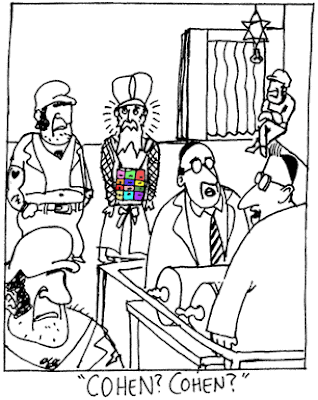The generation of the desert, the Dor Hamidbar, was on a very high level. They were a "dor de'ah", a generation of knowledge, on the level of Bina. Yet they committed the sin of the Golden Calf [parshas Ki Tisa]. This sin was a direct result of their own intellectualization, their miscalculation of when Moshe should have come back from his spiritual elevation on Mount Sinai. [The verse says "boshesh Moshe" and Rashi from the Gemara explains that it means "ba shesh" - that they calculated that Moshe should have been back by the 6th hour of the day.] It was their own intellect which brought them into trouble--they wavered in their trust of Moshe and over-intellectualized the situation.
The midrash states that the Soton showed them Moshe lying on his deathbed, which opened them up to consider the reasoning that Moshe should have already come down. The Ohr Hachayim explains that what they saw was "with the eye of the intellect"--they didn't hallucinate, but rather they misinterpreted the reality.
Amidst this confusion comes the Erev Rav, the Egyptian magicians who left Egypt with the children of Israel, demanding a new leader to replace Moshe -- since they saw that the Jews were wavering, open to the suggestion that Moshe was delayed and could not descend from the spiritual heights he had ascended to. This is the cause of the Golden Calf [see the Ramban--it was a replacement for Moshe, not Hashem].
When Moshe ascended the mountain, the Arizal states that he received 1,000 lights. This is the level of Moshiach. Moshe had been elevated to Moshiach on the mountain, but the people did not withstand the test; their faith in Moshe wavered, allowing the Erev Rav to bring about the sin of the Golden Calf. This caused Hashem to say to Moshe "Go, descend" [32:7], says Rashi: "Descend from your greatness", descend from the level of Moshiach.
The Arizal writes that the final generation is a reincarnation of the Dor Hamidbar. The Lubavitcher Rebbe said explicitly that this applies to us - we are literally the souls of the generation of the desert. In Rambam's "13 Ikkarim" he writes that we believe in the coming of Moshiach "even if he delays".
Why does the Rambam feel the need to mention a delay here? What's the connection between Moshiach and a delay? The first redeemer [Moshe] is the last redeemer [Moshiach] and perhaps our situation now - waiting in the confusion - is the tikkun for the situation the first time around?
The Rambam explains in Hilchos Tshuva that "Tshuva is completed when an opportunity to commit one's original transgression again arises but one doesn't and repents instead." We are the generation of the midbar--we are rectifying our sin by waiting for Moshiach. Despite what the eye of the intellect might think, our obligation is to trust in Moshe Rabbeinu, not to seek a replacement leader. Not to let the Erev Rav within us entice us to find a "new leader" of the Jewish nation, to make a new Golden Calf [G-d forbid].
Moshe Rabbeinu doesn't need to be replaced, and we are playing our role in the final tikkun. Hold on strong with emunah that goes beyond the intellect and "even though he delays, we wait for him every day".














